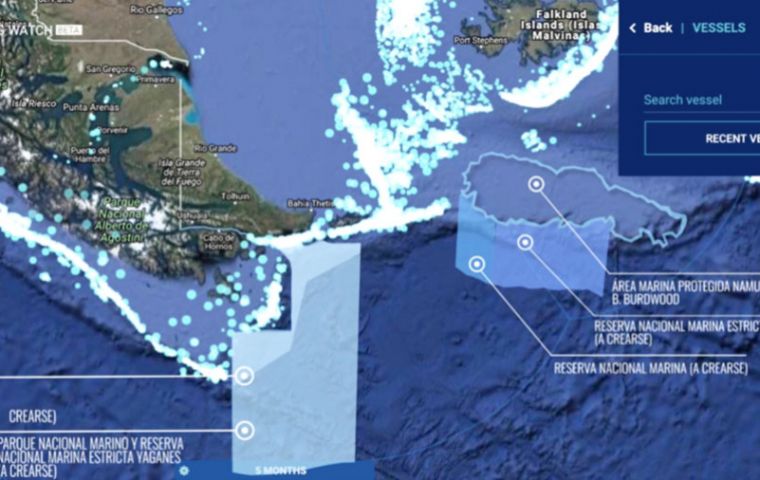MercoPress. South Atlantic News Agency
Argentina creates two marine protected areas in the South Atlantic
 Namuncurá-Burdwood Bank II Marine National Park is located in the South Atlantic and Yaganes Marine National Park lies off the southern tip of Argentina
Namuncurá-Burdwood Bank II Marine National Park is located in the South Atlantic and Yaganes Marine National Park lies off the southern tip of Argentina Argentina has officially created two large marine protected areas: the Yaganes Marine National Park, lying off of the country’s southern tip, and the Namuncurá-Burdwood Bank II Marine National Park in the South Atlantic. Together, the two parks cover a total area of about 98,000 square kilometres.
By designating these two marine parks, Argentina has increased the total area of its protected ocean to about 8%. This puts the country closer to achieving its commitment of protecting 10% of its national waters by 2020 under the biodiversity targets of the United Nations Convention on Biological Diversity (CBD).
Recent explorations of the areas now designated as marine parks have shown that the waters and surrounding land are home to a rich diversity of marine creatures including the South American sea lion (Otaria flavescens); king (Aptenodytes patagonicus), rockhopper (Eudyptes spp.) and Magellanic penguins (Spheniscus magellanicus); South American fur seal (Arctocephalus australis); several species of sharks and rays; and rare cold-water corals. Many marine species in these parks are not found anywhere else on Earth. The sea floor is also covered by mountains and canyons and giant kelp forests, the expeditions conducted by National Geographic’s Pristine Seas team, the government of Argentina, the government of Tierra del Fuego, and the Forum for the Conservation of the Patagonian Sea, revealed.
“Argentina’s new marine parks are a significant step toward the preservation of the ocean and the diversity of ocean-dependent species in the Patagonian Sea,” Claudio Campagna, a marine scientist at the Wildlife Conservation Society (WCS), which has provided support for the creation of the parks, said in a statement. “These parks will permit marine wildlife to pursue their life cycles undisturbed.”
Industrial fishing is both an important source of revenue for Argentina and a threat to the country’s marine life. Data from Global Fishing Watch, an NGO that tracks and shares fishing information in near-real time, show that very few vessels fish in the areas now designated as marine national parks. This evidence helped move negotiations with the fishing industry in favor of the marine parks, Global Fishing Watch said in a statement.
There’s a growing movement worldwide to increase the coverage of marine protected areas. From 430 marine parks in 1985 there are more than 15,000 protected areas today. These parks cover nearly 27 million square kilometers (10 million square miles), or about 7% of the Earth’s oceans, according to the latest figures from the U.N.’s Protected Planet data repository. (Mongabay).




Top Comments
Disclaimer & comment rules-

-

Read all commentsGood to see that they have kept away from certain areas that they claim.
Dec 17th, 2018 - 09:37 am +1Argentina's Continental Shelf Claims and The UN CLCA Commission (1 page):-
https://www.academia.edu/33898951/Argentinas_Continental_Shelf_Claims_-The_UN_CLCS_Commission
And what does international law say about the ownership of natural resources?
Brit Bob, my understanding is that the UK is going to declare the North Sea as a marine national park, only the UK can fish in said waters.
Dec 18th, 2018 - 12:37 pm 0Commenting for this story is now closed.
If you have a Facebook account, become a fan and comment on our Facebook Page!